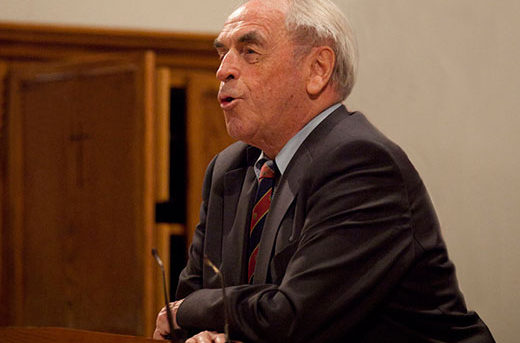Happy Moltmann Monday! Last week was happy indeed as I got to spend a day with Dr. Moltmann and hear him share his thoughts about the future of Christianity and the Church at the Unfinished Worlds conference at Emory. I appreciated not only his lecture but the wisdom I gleaned from the other lecturers as well.
So today instead of a passage I’m going to give a quick summary of some of his lecture’s main points.
He started off with a bang by talking about dispute and dialogue. (Nearly all the questions at the end of the lecture were in response to this point.) He talked about the Reformation giving us a tradition of “yes or no” and “we confess and we reject.” Obviously we know the Reformation began as protest and dispute with Luther nailing 95 points of them to the church door at Wittenburg. Dialogue is also necessary. He talked about moving from a church-centered theology to a theology that faces and engages the world. As Moltmann said, “If we don’t speak with one another today we may shoot each other tomorrow.” BUT…he had strong criticism for the prevailing dialogue of today, which seems to be without any characteristic of dispute. He pointed to American television, saying in modern talk shows everybody talks but nobody listens. And it’s uninteresting, because it’s pointless dialogue. He said, “Theology has become a harmless business.” We need a culture of dispute that is disrespectful. He said, “Tolerance is good but only to be tolerated is bad.” As a theologian he wants to be tolerant, but he does not want to be tolerated.
Moltmann then talked about the unity and catholicity of the church, asking how the church-state and the state churches come together for unity. He suggested the “papacy of all believers,” which was a turn of phrase that got the crowd’s attention. He said we were to understand papacy in a pre-Constantinian way, so that it means that the nearer we come to Christ the nearer we come to each other.
Moltmann spent quite a while talking about the Anabaptists. He described them as the only Reformation group to truly live into the Reformation mantra of sola fidei, faith alone. Anabaptists rejected the state religion, believers baptism, the military, and giving oaths. They took no part in government. Through all of these actions Anabaptists showed that they fully rejected the empire. Much is to be commended about that.
In wrapping up this section, Moltmann said we have three options in relation to swords. One, we turn the swords into Christian swords. That is what the empire did. Two, we ignore the swords, which is in large part what the Anabaptists did. Or three, we beat the swords into plowshares. Moltmann advocated for the third choice, saying it’s not enough to be a peace church. We are also called to be a peacemaking church.
Then he turned to communion, reiterating the importance of an open table. (Yes!) And he suggested we receive communion, sit back down together, and talk about what we’ve experienced. I think that’s a fantastic idea.
A couple of other quick points: He said it’s important to remember that the reformation was related to the existing church not a future church. It was a reformation not a mission. And we need to hold onto a sense of the future of the church, the mission, as we move forward.
Lastly, he said the apocalyptic thinking of Luther and others is growing old, because they presumed themselves to be in the age of the messiah, assuming that the next age would be the end of the world. Which, in practical terms, leaves Christians sitting around waiting for the end. Instead he called upon us to center on the resurrection, and remember that Jesus said, “Behold I am making all things new.” So it’s not just grace alone but a grace that is born within us as a living hope. There is a living, moving, breathing, changing nature of faith that is to be embraced as we move toward the future.
I wasn’t able to hear his lecture the following day, but I’ve heard it will be posted on Vimeo in the weeks to come and I’ll share a link. I found much to ponder in his opening lecture, and hope you enjoyed this brief overview of my rapidly-written notes!

1 Comment